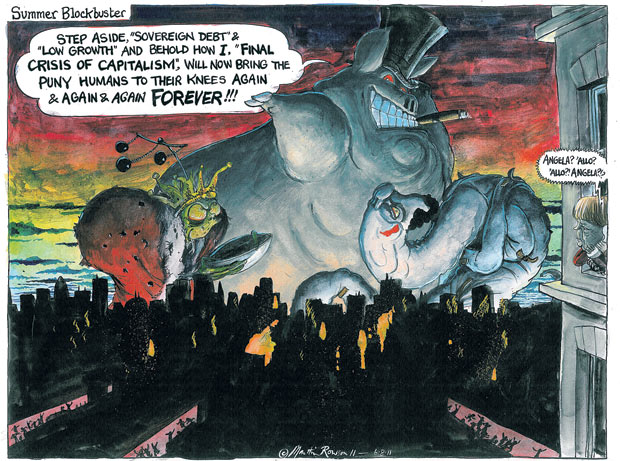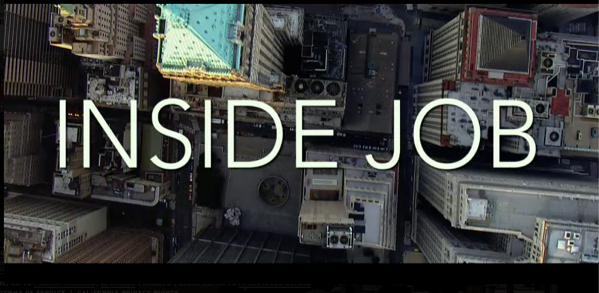From The Guardian: Martin Rowson on the final crisis of capitalism
European and North American stock markets are at their most volatile since the 2008 collapse of Lehman Brothers.
We had a GFC film festival at our house over the weekend watching Michael Moore’s Capitalism: a Love Story and the Academy Award winning documentary Inside Job. If you haven’t seen Inside Job, see it. Really. It will leave you speechless.
Wow, both films left me with a sour haze only slightly lifted by the All Blacks Bledisloe Cup win over the Wallabies (30-14).
In the context of the fake debt ceiling ‘crisis’ and the S&P ‘downgrading’, these films look prescient. They expose and condemn the same old faces and political system they run — even though some key players ‘declined to be interviewed for this film’. Ghastly.
I have to say, it really does look like the US political system works for Wall Street, and, in the same way the US economy has bankrupted itself to fund arms manufacturers, the system also seems to bend over backwards to pander to the big banks, with self-interested bankers slipped into regulatory offices with an apparent agenda to dismantle the watchdogs.
Larry Summers. What can I say? Yuck. These guys give a whole new meaning to the phrase ‘public service’. Please.
– P




Michael Moore?
Although I find his documentaries mildly amusing,he wouldn’t be my first choice of serious economic commentator. He is a convincing and often manipulative critic of any policy to the right of pure socialism, but have you ever looked at the economic policies he proposes?
For example, Mr Moore is a fierce critic of globalisation, and he is a big supporter of trade protectionism.
These policies are the Road to Serfdom…
Rgds,
*p*
No, I don’t watch Michael Moore for his economic policy either, but that’s not his ‘major’. He specializes in unmasking hypocrisy, corruption and doublespeak.
In his ‘Capitalism’ film Moore highlights the ludicrous ‘stacking’ of public office with banking industry/Wall St reptiles (no offence intended to you, poormastery — it seems it was mainly Goldman Sachs) from the loathesome Donald Regan to the even more so Larry Summers.
Their [IMO] corrupt dismantling of the few shreds of regulatory power enabled the 2000s giant ponzi scheme of derivatives, junk bonds, CDOs and the Credit default swaps (where banks were betting against their own clients) to run amok.
Moore’s film fingers these and other influential ‘public servants’ (vomit) and those whom Obama re-appointed (to howls from the left, in some cases) and who continue – even today – to queer the pitch in favour of Wall St.
We’re all living with the results.
For many of those whom were advanced complex, predatory loans by the likes of Countrywide and Washington Mutual, and who have lost everything at the subprime casino, and who today suffer in the global recession the inevitable bubble burst triggered … well, poormastery, their experience could be said to be indistinguishable from your ‘Road to Serfdom’.
– P
I see it all slightly differently.
Obviously, since I work in the industry, my views on this topic have something of a conflict of interest. So be it…
The banks have systematically mispriced risk for the past 40 years or so (not just subprime debt, but all credit including the sovereign debt market). 1971 and the US leaving Bretton Woods probably marked the start of this leveraging up process…
The sovereign debt market is much bigger and scarier than the subprime debt market. Insolvent countries were allowed to borrow for a few paltry percentage points for years or even longer. This seems crazy now…
There has therefore been been mass incompetence in the financial services industry, and of course there has also been some corruption. I think that the charge that all the investment banks were systematically betting against their clients as per the Goldman’s case is not proven, although I concede that it is a greed fuelled industry of considerable disrepute.
Many banks owned huge quantities of the crap they were selling to clients, proving that they didn’t always know that they were selling crap at all. The reason the bank I currently work for did this was that funding rates were so low (due in part to weak central banks, and in part to exchange rate manipulation by the Chinese and others). The traders could become rich by leveraging positive carry. They were picking up pennies in front of steamrollers…
Would more regulation have helped? Perhaps. It can’t have really materially worsened the outcomes that we see now.
Nonetheless, the regulators received huge amounts of information in the last 40 years. I am not sure that they even understood what they were looking at. Yet they were happy. Everyone was happy. The world economy was booming. As such, there was no problem. It is revisionism to see it otherwise?
Hindsight is 20 / 20. That there was a massive problem with over-leveraged sovereigns (an issue that puts subprime in the shade) and too much private debt in the West was something of an elephant in the room.
Yet virtually no respectable economist saw this in advance. Mr Roubini (Dr Doom) was one of those who did. He was derided as a nut, and was obscure outside of hardcore economist circles. There were a couple of others. Most commentators opined loudly after the fact, but where were they in 1996 or 2006?
Human beings are great at making rationalisations. In the face of huge evidence of an over-leverage world, rationalisations are what people did. The explanations for huge balance sheets included the idea that the East would soon copy the West’s huge leverage, and so forth. In other words, the leverage was normal. Life certainly seemed to be normal enough, in a boom market sort of way…
Derivatives are not new. CDS are simply insurance contracts. I am not sure that insurance is inherently evil. Mr Milken saw junk bonds as solving the issue of Third World poverty, and indeed, issued and used properly, these products can help humanity. Hedging your fuel costs, if you are an airline, is probably prudent? Hedging with derivatives if you are a farmer might help you sleep at night, and pay your bills? Derivatives are not all bad. They enable you to be able to fix your mortgage (this can be convenient, no?).
Irrespectively, we are now getting the regulations. So be it. Everyone knows that the banks need to increase capital massively to withstand the next round of (this time sovereign) failures, in any case.
Judging by history, regulations won’t stop the business cycle of boom and bust. The emotions of greed and fear are too embedded in the pyschology of people. There is no escape. It is part of being human.
Attributed to Isaac Newton after apparently losing everything during the South Sea Bubble is this:
“I can calculate the motions of the heavenly bodies, but not the madness of men.”
Quite.
Rgds,
*p*
What an excellent comment/treatise! Thanks.
‘De-regulation’ has such a nice ring to it, but we’re all wearing the results: capitalism/individual profits when it’s working, shared-pain/bailouts/socialism when it’s not.
Derivatives, of course, have/had their uses, but that ‘market’ was exploded into a gambling den … staffed by the greed and fear/boom and bust psychology you discussed.
– P